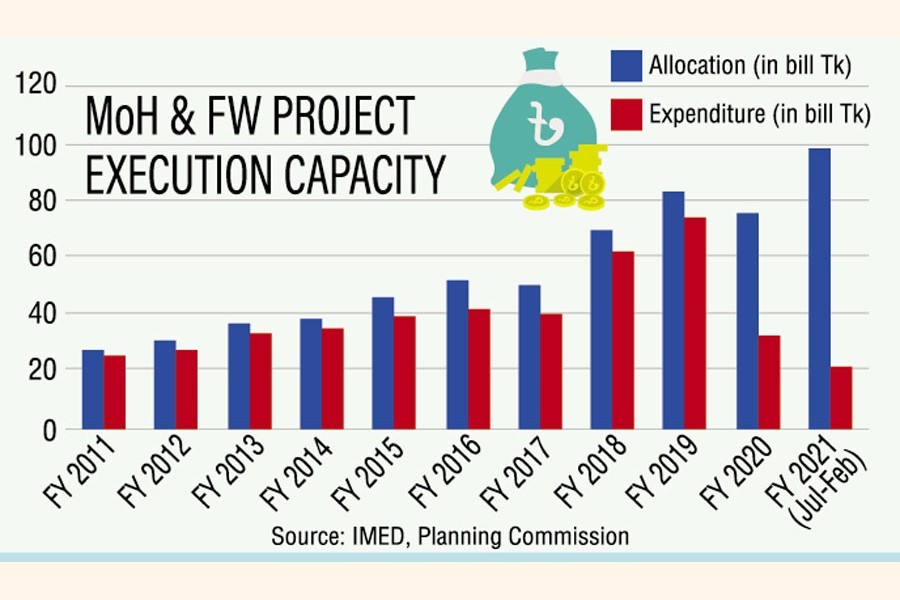The Ministry of Health and Family Welfare (MoH&FW) was again in the slowest lane in terms of implementing development projects in this fiscal year (FY), 2020-21, its poor service providing capacity, analysts said on Friday.
The ministry had performed poorly in executing its projects during the last one decade also, resulting in massive service fallout across the country during this pandemic, they added.
The sudden surge of coronavirus infection during the pandemic second wave has been daily claiming more than 50 lives along with detection of more than 5,500 cases in Bangladesh over the last few days. Till Friday, the country lost 9,155 lives and recorded 624,594 cases.
According to the FE analysis, the health ministry was the worst performer in implementing development work in the first eight months of the current FY.
The ministry had spent only 21 per cent of its annual development programme (ADP) budget so far. The rate was just half compared to the government's better performing ministries in the same period.
According to the Implementation Monitoring and Evaluation Division (IMED), the health ministry got the highest-ever budget allocation under the ADP in FY 2021. But, it had failed to duly implement the development projects, which got the government's highest priority.
"This is the lowest performance among the top 15 development budget holders of the government. This is really unfortunate, when our situation is very pathetic during the pandemic," said a member of the Planning Commission on condition of anonymity.
The ministry had been showing almost the same weakness in its project implementation over the years, he added.
Economists and development analysts said the health ministry's miserable capacity, various types of corruption, and lack of transparency had put Bangladesh in a vulnerable condition during this coronavirus pandemic.
They urged the government to restructure the country's health administration for enhancing its project implementation capacity and providing better service to people.
The FE analysis found that the health ministry, on an average, had failed to spend more than 83 per cent of its yearly development budget allocations during the last 10 years between FY 2011 and FY 2020.
Besides, the ministry had fallen behind by 7.0 percentage points on an average from the overall ADP implantation rate during the last one decade.
The ministry's Health Services Division (HSD) had spent only Tk 20.81 billion, 21 per cent of its total Tk 97.36 billion allocation in the ADP, in July-February period of the current FY.
In the same period or first eight months of FY 21, the overall ADP expenditure rate by all the ministries and agencies was 34 per cent.
The HSD had executed only 74 per cent of its total development outlay in the previous FY, while the average rate was 80 per cent.
The FE analysis also found that the health ministry's development project execution capacity was better 10 years back, as it implemented 93 per cent of its projects under the ADP in FY 2011.
Its performance fell to 88 per cent in FY 2012, but boosted again to 92 per cent in FY 2013, and 91 per cent in FY 2014.
But since FY 2015, the health ministry's implementation rate had started falling. It spent 85 per cent, 81.5 per cent, 80 per cent, 89.6 per cent, 88.7 per cent, and 74 per cent of the ADP outlay in FY 2015, FY 2016, FY 2017, FY 2018, FY 2019 and FY 2020 respectively.
The ministry in the last six years between FY 2015 and FY 2020 had performed worst compared to the same between FY 2011 and FY 2014.
When asked, Saidur Rahman, Additional Secretary of the HSD, told the FE that they had identified some problems in implementing the development works properly.
The problems included frequent transfer of officials concerned, lack of coordination and strict monitoring, and poor expertise of the project directors and relevant persons in procurement.
"But we are hopeful of doing better in the future by overcoming those hurdles," he added.
Dr Khondaker Golam Moazzem, Research Director at the Centre for Policy Dialogue (CPD), told the FE that the health ministry had been showing poor project implementation almost every year, proving its deplorable institutional ability.
"We have already seen that there are nexuses among the authority and some contractors in supplying goods and services. Such corruptions might further dampen the ministry's capacity."
Public health expert Prof Dr Rashid-e-Mahbub said corruption and mismanagement in the health department were the main obstacles to improve its services.


